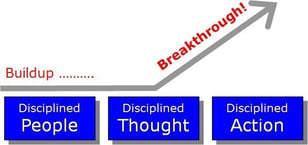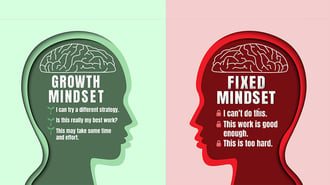 Thursday last week one of my customers leadership teams addressed the issue of working from home.
Thursday last week one of my customers leadership teams addressed the issue of working from home.
Work and home activities have blended into one, challenging many by causing stress and mental health issues. How can we help our people? Are we victims as well?
This week, guest writer, Cristi Waterson, shares 6 ways Entrepreneurs Can Improve their Mental Health.
During these difficult times, many entrepreneurs are under tremendous stress. It’s become imperative they know safe practices for employees to help protect their mental health.
With a large part of the general workforce now working from home, entrepreneurs adapted to managing their employees remotely. This new form of management challenges employers and employees, potentially impacting their overall well-being and leaving everyone involved vulnerable to mental health issues.
 There are some things all entrepreneurs can do, pandemic or not, to help minimize the risk of mental health problems arising from business pressures. In turn, they can promote better physical health and social interactions for themselves and their employees.
There are some things all entrepreneurs can do, pandemic or not, to help minimize the risk of mental health problems arising from business pressures. In turn, they can promote better physical health and social interactions for themselves and their employees.
Encourage Movement
Managing a business sometimes places wellness in the back of your mind. Instead of scheduling time for exercise, entrepreneurs often devote their attention to growing their business and improving their services. However, physical activity is crucial for maintaining your physical and mental health.
A cross-sectional, wide-scale study showed that active individuals had 43.2% fewer days of adverse mental health each month than sedentary persons. All exercise types showed a reduction in mental health issues, but the most substantial impact occurred in team sports, cycling, aerobics, and gym-going. Exercising 45 minutes three to five days a week showed significant improvements in conditions like anxiety, stress, depression, and cognitive function.
Rest and Recharge
Before the pandemic began, increasing screen time already concerned scientists who documented its adverse effects physically, socially, psychologically, and neurologically. Excessive screen use correlates with poor sleep, cardiovascular disease, impaired vision, reduced bone density, depression, trouble focusing, and antisocial behavior.
The average American's screen time has increased from four to six hours a day, contributing to even more health problems. To combat these issues, take regularly scheduled breaks to rest your eyes, walk, stretch, meditate, or even close your eyes and take a few deep breaths.
A small break from sitting and screens every 30 minutes can protect you from the harmful consequences of a sedentary lifestyle.
Exposure to Nature
Incorporating natural elements and sunlight exposure improves employee job satisfaction, commitment, stress, anxiety, and depression. Natural elements include plants, photographs of nature, and windows with natural views.
Both direct and indirect sunlight can benefit you and your employees by optimizing your Vitamin D levels. Optimal Vitamin D levels correlate to improvements in cognitive function and mental illness.
Additionally, sunlight increases the body’s production of Vitamin D, which in turn helps to optimize your immune system. Studies have also shown that increased sunlight exposure correlates to lower COVID-19 mortality rates.
Getting about an hour of midday casual sunlight exposure can maintain adequate Vitamin D levels. Try to go for a walk or do some outdoor yoga during sunrise, sunset, or your lunch break. If not possible, consider taking a high-quality Vitamin D3 supplement of 1000 IU or more.
Eat Nutritiously
Food controls how we feel, from the amount to the nutritional breakdown. Eating primarily processed foods can leave you feeling lethargic. Studies have shown a strong correlation between an unhealthy diet composed of soft drinks, takeout, fried foods, high-fat foods, processed snacks, and sugary desserts with poor mental health.
Conversely, diets high in vegetables, fruits, and whole grains had better psychological effects. While the healthiest diet depends on your physiology, most evidence supports intaking minimally processed foods and mostly plants. Make sure to properly prepare your foods in a way that reduces anti-nutrients and maximizes bioavailability.
Eating well all the time may not be realistic and focusing too much on your physical health can lead to more stress. An 80/20 balance of healthy to unhealthy foods will allow you to enjoy the foods you love without compromising your physical or mental health.
Prioritize a Work-Life Balance
As an entrepreneur, you may set your life aside to care for your business. However, overworking can take a toll on your mental health. Since many people must work from home, it can get harder to separate your work and personal life.
Stick to predetermined working hours, as if you were at the office. Designate a spot for work, preferably outside your bedroom (or at least not on your bed). Change into your professional clothes if possible and switch out of them once your work has finished. Make sure you get plenty of sleep, eat enough food, take breaks, and delegate the work to your employees.
Be Kind To Yourself and Others
Instead of pushing yourself to meet unrealistic deadlines and punishing yourself when you miss them, accept what happens and focus on the positive aspects. Often, the pros outweigh the cons, but we tend to fixate on negativity.
As we struggle to navigate the changing workforce during this stressful time, entrepreneurs must know safe practices for employees and implement guidelines to ensure everyone’s wellbeing. Collaboration and understanding are crucial to the process.
Bottom Line
The pandemic will end someday, but some things may have changed permanently. However, even when the pandemic ends, taking care of yourself can facilitate better mental health and stronger company morale no matter what is going on in the world.
By encouraging self-care practices and creating safe working conditions, you can maximize your business without compromising mental health. Try to integrate some of the above tips into your company to benefit your workplace daily, not just during stressful times.
To create an environment where everyone is inspired to give their best, contact us today to schedule a free exploratory meeting.
Growth demands Strategic Discipline.
 To build an enduring great organization, requires disciplined people, disciplined thought, disciplined action, to produce superior results, and make a distinctive impact in the world
To build an enduring great organization, requires disciplined people, disciplined thought, disciplined action, to produce superior results, and make a distinctive impact in the world
Discipline sustains momentum, over a long period of time, laying the foundations for lasting endurance.
A winning habit starts with 3 Strategic Disciplines: Priority, Metrics and Meeting Rhythms. -2.jpg?width=310&name=3%20Disciplines%20of%20Execution%20(Strategic%20Discipline)-2.jpg) Forecasting, accountability, individual, and team performance improve dramatically.
Forecasting, accountability, individual, and team performance improve dramatically.
Meeting Rhythms achieve a disciplined focus on performance metrics to drive growth.
Let Positioning Systems help your business achieve these outcomes on the Four most Important Decisions your business faces:
|
DECISION |
RESULT/OUTCOME |
|
PEOPLE |
|
|
STRATEGY |
|
|
EXECUTION |
|
|
CASH |
|
Positioning Systems helps mid-sized ($5M - $250M) business Scale-UP. We align your business to focus on Your One Thing! Contact dwick@positioningsystems.com to Scale Up your business! Take our Four Decisions Needs Assessment to discover how your business measures against other Scaled Up companies. We’ll contact you.
 NEXT BLOG – Mindset: Fixed or Growth?
NEXT BLOG – Mindset: Fixed or Growth?
A growth mindset is generally better than a fixed mindset. A Growth mindset turns failure into a gift. Do you have a Fixed or a Growth mindset? We share Questions to discover your mindset next blog.






.jpeg?width=150&height=135&name=Hand%20with%20marker%20writing%20the%20question%20Whats%20Next_%20(1).jpeg)

